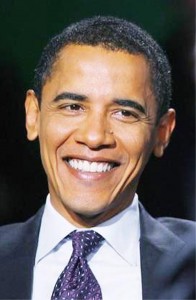PRAGUE, (Reuters) – President Barack Obama set out his vision for ridding the world of nuclear arms yesterday, declaring the United States ready to lead steps by all states with atomic weapons to reduce their arsenals.

Delivering a speech given new urgency by North Korea’s rocket launch hours earlier, Obama said the United States would go ahead with plans to build a missile defence shield in Europe as long as Iran posed a threat with its nuclear programme.
On a visit to the Czech capital, once a focal point in the Cold War between the West and the Soviet Union, Obama pledged to cut the U.S. nuclear arsenal, to bring the Comprehensive Test Ban Treaty into force and to seek tough penalties for those that broke rules on non-proliferation.
“The United States will take concrete steps towards a world without nuclear weapons,” he told a cheering crowd of more than 20,000 in Hradcanske Square outside the mediaeval Prague Castle.
“To put an end to Cold War thinking, we will reduce the role of nuclear weapons in our national security strategy and urge others to do the same,” Obama said, adding: “We will seek to include all nuclear weapons states in this endeavour”.
He acknowledged the goal of a nuclear arms-free world might not be reached in his lifetime and added: “Make no mistake: as long as these weapons exist, we will maintain a safe, secure and effective arsenal to deter any adversary”.
Referring directly to North Korea, he said Pyongyang should be punished for breaking the rules with its rocket launch and called on it verifiably to scrap its nuclear weapons programmes.
North Korea’s defiance of U.S. warnings was Obama’s most serious foreign policy challenge since he took office on Jan. 20, and the world will watch closely his handling of it.
“Now is the time for a strong international response. North Korea must know that the path to security and respect will never come through threats and illegal weapons,” he said.
North Korea said the launch was intended to put a satellite in orbit. The White house said the launch was “unsuccessful”.
In a speech which at times recalled Cold War-era trips by U.S. presidents John Kennedy and Ronald Reagan to once-divided Berlin, Obama hailed the Czechs’ doomed 1968 attempt to halt the Soviet invasion in the “Prague Spring” and the bloodless Velvet Revolution that finally ended communism there in 1989.
With Poland, the Czech Republic is one of two sites in eastern Europe earmarked for a U.S. missile shield promoted under the Bush administration and condemned by Moscow as an act of aggression aimed against Russia.
Bush said the shield was necessary to counter threats from what he called rogue states such as Iran. The new administration has been less assertive in pushing the plan, insisting it would be reviewed for cost-effectiveness and viability.
Obama presented Iran — a U.S. foe he has sought to engage diplomatically — with a “clear choice” of halting its nuclear and ballistic missile activity or facing increased isolation.
“As long as the threat from Iran persists, we intend to go forward with a missile defence system that is cost-effective and proven,” he said in some of his clearest comments on the plan.
The United States has tried to engage Russia in coaxing Iran into giving up its nuclear programme, which Iran says is peaceful. A success there would help Russia avoid deployment of the missile bases.
A U.S. official said Obama told Polish leaders in a meeting on the sidelines of an EU-U.S. summit in Prague later yesterday that the United States would continue research and development of the missile shield.
But he added that “missile defense is no panacea, particularly missile defense that is not proven to work.
“(Obama) is supportive of the system as part of a larger effort to protect our national interest, our national security but at the same time it needs to be proven and it needs to be cost-effective.”
Czech Prime Minister Mirek Topolanek, whose government backs the project despite opposition by most Czechs suspicious of a foreign military presence, said he understood the plan was not being scrapped.
About 600 anti-shield protesters marched through Prague after the speech, with banners reading “Yes, we can … say no to military bases”, a play on Obama’s election slogan.
Aides said Obama hoped setting out his vision for a nuclear-free world would lend credibility to Washington’s efforts to resolve atomic disputes with countries such as Iran and North Korea.
Obama said he would host a summit within a year on global nuclear security, covering issues such as preventing the smuggling of nuclear material and keeping atomic weapons out of the hands of terrorists.





